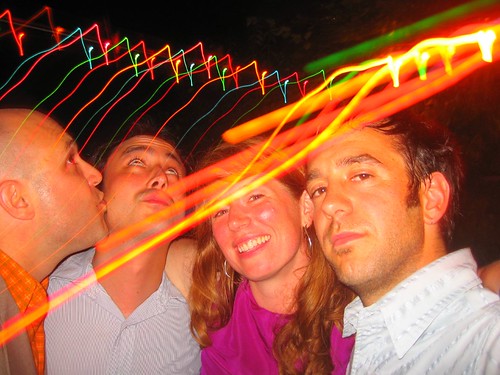Bookforum recently published a tribute to Thomas Pynchon called "Pynchon from A to V," written by critic and Pynchon maniac Gerald Howard. Most Pynchon fans discover that their love dare not speak its name because when it does, it instantly labels one as a literary snob and smartypants. Like experience in armed combat, love of Pynchon and Gravity's Rainbow is best delivered in the format of memoir, and Howard's affectionate tale of his own Pynchon obsession inspired me to reconsider mine.Let's first get the unavoidable and unfortunate realities out the way: Gravity's Rainbow is dense and unfriendly. Pynchon's characters appear from nowhere, have bizzare names, and disappear without a trace. Poof! Gone. Most vexing of all, reading Pynchon in general, and GR in particular, requires wrangling zillions of intricate conspiracies within conspiracies, many of which seem to have no bearing on the Point of the Book, whatever the heck that may be.Howard's GR experience was similar to mine, a kill-or-be-killed, finish-or-die-trying affair. I read GR when I was 23. It was a time of confusion, bluster, distrust, cut with confidence that my recently-acquired BA in English had given me unique insight into the world; in other words, I was GR's ideal reader. It could be argued that few readers who aren't young, male lit majors would subject themselves to a 760 pages of punishment thinly masked as intrigue. Who else would have the faith, or time, to read and re-read page after page, memorizing seemingly pointless details because any detail may suddenly become somehow relevant? At the time I read GR, I had just moved to a big city that seemed populated by the very people who populated Pynchon's pages — shadowy people with sinister secret lives. Perhaps their shadowy, sinister appearance was a result of the fact that I didn't know anyone, had a terrible job, no girlfriend, no band and very little money. Moreover, I didn't know what I wanted to be doing, who I wanted to be. Like the protagonist Tyrone Slothrop, I was filled with unease and concern. And yet at the same time I was having TONS of fun. Doing absolutely nothing except marveling at the mysteries of everything around me. I loved it, but I wanted it all to end, and I wanted to figure it out — all at the same time. And the book! The book provided a very faint hope of actually understanding something, anything. Immersed in the world of GR, all of life was a puzzle to solve, a knot to unravel, a refined and glamorized version of my own world. Slothrop was me: a confused mix of unease, hope, and good times. Of course, vast sections of the book nearly crushed me. I often completely forgot what had happened on the previous page, or who a character was. I must have re-read enough pages to read the book twice.But I was propelled by the illuminating, invigorating passages that laid bare the elements that so many recent bachelors of arts seek to understand — the impersonal forces at the heart of civilization, the greedy corporations governing our daily lives, the evil truth behind the happy facade. Pynchon brings these things to life in passages of overwhelming, all-encompassing knowledge (nowadays imitated by the likes of JFranz, DFW, etc), and within them exists a character quite familiar to my younger self — a hopeful, curious guy who wants to know the answers but can do no more than uncover mysteries of greater magnitude.Readers rebuffed by its complexity might argue that GR's greatness is a collective delusion of the few readers willing to endure the punishment, the endless parade of bizzarely-named characters, the narrative digressions leading to further digressions that ultimately become the narrative, the problem of the protagonist disappearing somewhere around page 500 — the list goes on. To them I say this: You really need to make it to the end to understand. Better yet, don't expect to really understand anything. Then you'll be ready to start.
Bookforum: "Pynchon from A to V."
